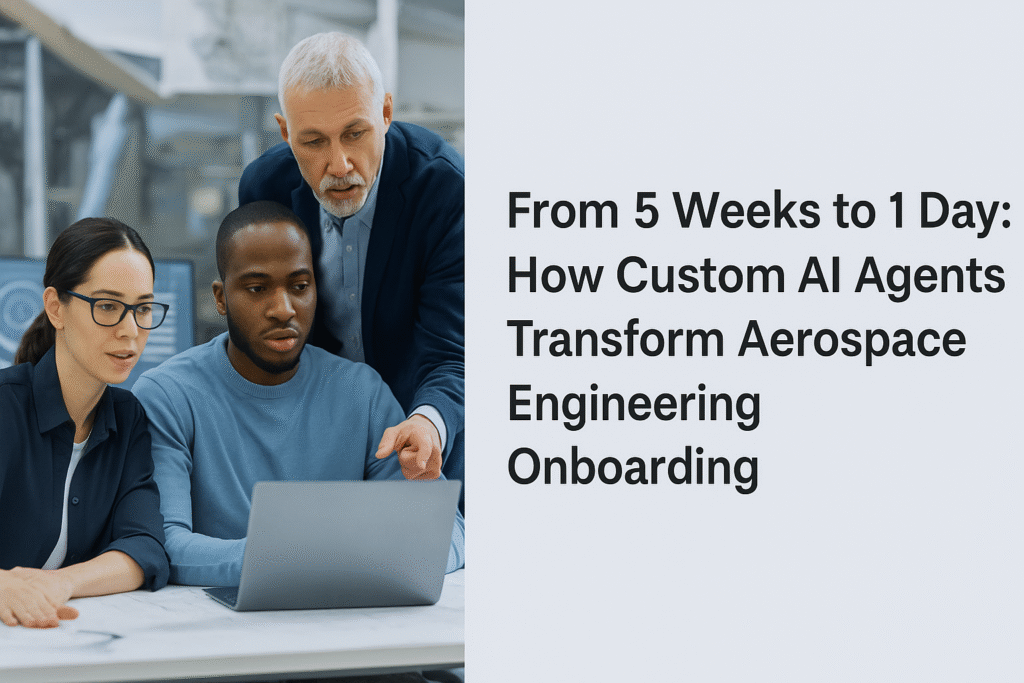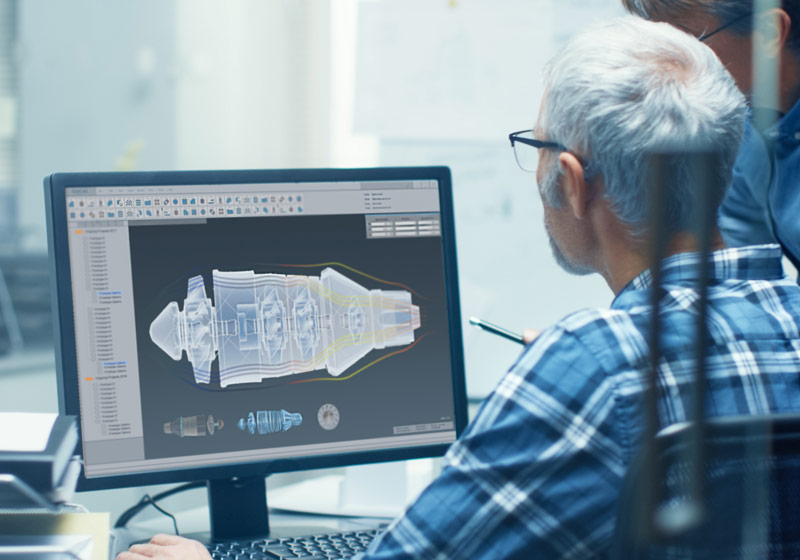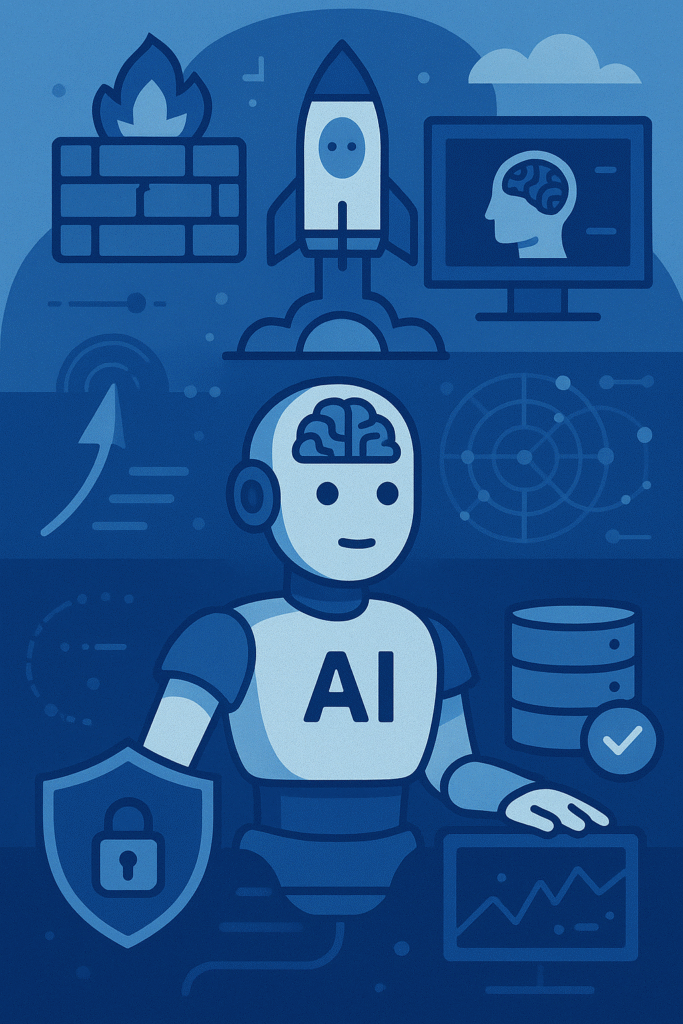Executive Summary
The aerospace and defense sector is under immense pressure. A looming talent shortage and increasingly complex programs are colliding with outdated onboarding methods. Traditionally, it takes five weeks before a new aerospace engineer reaches partial productivity. That delay is no longer acceptable.
Custom AI agents are rewriting the onboarding process—cutting time-to-productivity from five weeks to a single day, reducing compliance errors, and saving over $50,000 per hire.
The Challenge: A Workforce at the Crossroads
By 2031, more than 2.4 million aerospace workers will retire. At the same time, major programs like Artemis, B-21 Raider, and next-generation hypersonics demand specialized knowledge that is not easily replaceable.
Onboarding in aerospace is far more than HR paperwork. New engineers must master:
Highly complex technical systems with millions of interconnected parts
Stringent regulatory frameworks (ITAR, EAR, DFARS, AS9100)
Legacy knowledge held by retiring experts
Program-specific procedures and security clearance protocols
Traditional methods take three to five weeks just to bring a hire to 50% productivity, and up to six months for full integration. For contractors working under tight budgets and timelines, this delay is a competitive liability.
How AI Agents Reimagine Onboarding
Instead of weeks of static training modules and waiting on senior engineers, AI agents provide real-time, contextual guidance from day one.
Intelligent Knowledge Repositories
AI agents house decades of institutional knowledge in an accessible, searchable format. They can interpret MIL-STDs, design documents, CAD drawings, and test data—providing instant, accurate responses to engineer queries.
Personalized Learning Paths
No two engineers start at the same point. AI agents adapt onboarding to each role, background, and clearance level. Avionics engineers focus on electronics. Propulsion engineers dive into turbines. Information irrelevant to a role is filtered out, reducing overload.
Real-Time Technical Support
Rather than waiting for mentors to free up, new hires can access immediate technical help through AI agents trained on company-specific data, standards, and past decisions.
Case Study: A Defense Contractor’s Transformation
A major aerospace contractor onboarding engineers for a $2.8B fighter program faced delays that threatened delivery schedules. Partnering with NetRay, they deployed three tailored AI agents:
Technical Knowledge Agent – covering flight control, propulsion, and avionics
Compliance Agent – ensuring ITAR and AS9100 compliance in real time
Program Management Agent – guiding engineers on milestones, deliverables, and risks
The Results
Onboarding compressed from 5 weeks to 1 day
75% productivity achieved in the first week
$52,000 saved per engineer through faster integration
60% fewer compliance errors
Zero security violations, with AI enforcing clearance rules
This shift did not just save money—it safeguarded schedules, reduced mentor burnout, and increased engineer confidence.
Building AI Agents for Aerospace: The Framework
To succeed, AI onboarding systems must meet strict industry requirements.
Security First: Segregated networks, role-based access, ITAR compliance, and audit trails
Knowledge Integration: CAD ingestion, legacy PLM/ERP connections, real-time updates
Deployment Methodology: Knowledge capture from retiring experts, custom model training, pilot rollout, and phased scale-up
With the right framework, AI agents become an always-available mentor that scales across the organization.
The Bigger Picture: Beyond Onboarding
The impact doesn’t end once engineers are trained. AI agents act as permanent knowledge multipliers:
Capturing and preserving expertise from retiring staff
Providing 24/7 technical and compliance guidance
Standardizing practices across global sites
Enabling faster cross-training and career development
The result is not just faster onboarding, but a stronger, more resilient workforce.
Looking Ahead: The Future of AI Onboarding
Next-generation AI systems will push further:
Immersive Training: Virtual and augmented reality for hands-on aircraft familiarization
Predictive Learning: Identifying skill gaps before they become problems
Collaborative Intelligence: AI agents working alongside human mentors for blended learning
As aerospace programs grow more complex, the ability to transfer knowledge quickly and securely will become a decisive competitive factor.
Conclusion: The Competitive Imperative
Traditional onboarding methods cannot keep up with the aerospace talent crisis. Custom AI agents compress onboarding timelines from weeks to days, deliver major cost savings, and preserve institutional expertise at scale.
The choice is clear: organizations that embrace AI-powered onboarding now will lead in talent readiness, program delivery, and competitive advantage. Those who delay will face growing risks in an industry where time and precision matter most.
NetRay is already helping defense contractors achieve this transformation today.



